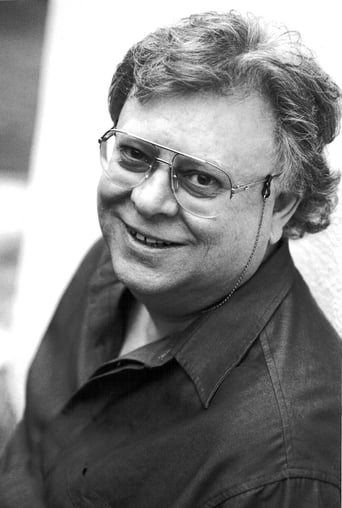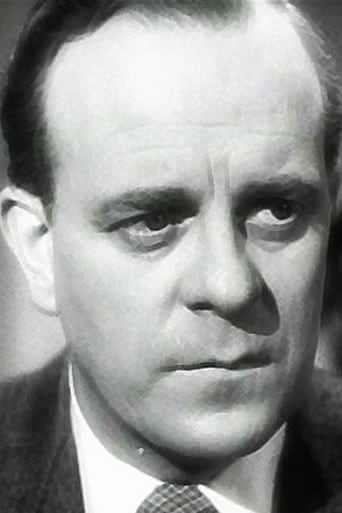Cubussoli
Very very predictable, including the post credit scene !!!
Jeanskynebu
the audience applauded
FuzzyTagz
If the ambition is to provide two hours of instantly forgettable, popcorn-munching escapism, it succeeds.
Jakoba
True to its essence, the characters remain on the same line and manage to entertain the viewer, each highlighting their own distinctive qualities or touches.
christopher-underwood
Nobody could claim that this is a great film, but it is amusing and it does portray well a certain moment in time in the British film industry. It is well enough made, indeed, this is the second feature from the man who would later direct the recent, Casino Royale and The Legend of Zorro and he certainly establishes something of a CV for himself with this. A keen group are out to make a film and a greasy executive/agent ably played by Roy Kinnear helps them raise the finance. Unfortunately everybody who can invest will invest only if the film is of the particular genre he wants and includes his latest girlfriend or even boyfriend in one instance. This means numerous versions have to be made and Cambpell certainly has fun here. For us though most of the fun is in the original setting up with interviews and casting. There is plenty of nudity but it is not in your face and as they say, essential in the script. One particular tableaux presumably for the porno version is well done and a cry from one of the more pretentious thespians is classic; 'But what is the motivation for my erection?' Stars the writer of this and director of Mark of the Devil, Michael Armstrong, who also worked with Pete Walker.
whatleym
The writer of this film is Michael Armstrong. He was also director/writer of a previous Tigon film 'The Haunted House of Horror'. During the making of that film he experienced some very unpleasant run-ins with an individual representing AIP (the American distributors). This resulted in Michael's script being re-written and a very different film to his original concept being produced as the end product. This film 'Eskimo Nell' parodies those experiences. Listen to Michael's voice over in the 'extras' section of the DVD of 'Haunted House of Horror' for a graphic description of his experience and learn who some of the characters in 'Eskimo Nell' actually represent!
FilmFlaneur
In the artistic wasteland of 1970s' British sex comedies (and arguably a good deal of British cinema at that time altogether) Eskimo Nell shines out as a modest beacon of wit, satirical in a way that still strikes a refreshing note. These days no doubt, Morrison and Tweedle would be assigned to work on several cheap UK gangster films at once, as that's the genre which has lately shown the greatest lack of nerve in the home grown industry. Back then, with UK's business in worse decline, it was such dire products as Come Play With Me (1977), that exemplified a depressing wave of home grown 'sex' films, neither sexy or arguably, real cinema at all: just the sad, exploitative effects of a restrictive lack of investment, and censorship. Together with the slightly more family orientated Confessions... series and the even softer saucy postcard world of the Carry On... series, this is what represented the officially sanctioned 'adult' industry at the time.Eskimo Nell's satire therefore had in its sights a ripe and obvious target, although it is still frequently overlooked as just another sex film of its time. Its a perception not helped by its small budget, mediocre (if enthusiastic) acting as well as a lingering air of titillation characteristic of the genre. Real life actor-screenwriter Michael Armstrong, whose previous film was the more predictable It Could Happen to You (aka: Intimate Teenage Secrets, 1975) - which would never the less make an interesting double bill with his Nell - made the hard to see crime factional drama Black Panther (1977) after this, before disappearing into TV and the humdrum. Greater things have come of the director Martin Campbell however, as he has since made such films as GoldenEye, Vertical Limit, as well as just being engaged on Casino Royale.The present film falls into three main parts. First there is the setting up of the project, a period of the narrative dominated by the avuncular, disreputable Murdoch - a professional performance by Roy Kinnear, the sort of role at which he shined. Once he disappears and matters move onto the complicated matter of the filming, then character comedy is swapped for situational, the change bringing probably the funniest moments of the film. Finally, there is the anticipated premiere, the chase after film canisters and so on, providing a suitable wrap up. As others have pointed out, this last section changes the emphasis of the satire somewhat, from one focusing purely on the sex film industry as such to mimicking the strategies of the caper film.Much of the pleasure of Nell comes from the incidentals, which have a real feeling of time and place, as well as a feeling that some of the principals had had first hand experience of the industry they spoof. As the guileless Morrison, Michael Armstrong makes an impression as a hopeful but little else; his pretentious cineaste-speak sounds hollow even as satire, especially when compared to the gloating, tit-centred obsessed speeches of Murdoch. Morrison's fazed expressions, to be replaced by that of creative concentration during the actual production, remind me of a similar innocent: that of Dennis Barlow, at the centre of Richardson's underrated The Loved One (1965). Both Barlow and Morrison share an initial bewilderment at encountering a strange society, and one tinged by aberrant sexuality. But while Morrison remains detached and never opportunistic (as well always slightly surprised at the brave new world in which he's suddenly found himself) Barlow is able, initially at least, to make headway of sorts. In fact one of the weaknesses of Nell is that its central trio contain no central dynamic, other than being desperate to salvage the situation in which they have been trapped. Even the penguin obsessed and virginal Tweedle, the most eccentric of the three, pales in significance compared to the outrageous characters surrounding him the sex film world.Nell follows in the tradition of the British sex comedy in never being erotic, merely naughty. It gains an edge for us today from being so self referential, with an intelligence missing from other productions of the time, and some have compared it to Truffaut's Day For Night (1973). In truth it is far less accomplished than that, bearing more of a resemblance to Confessions Of A Blue Movie Star (1978), being less about cinema itself than the practical bluntness required for the production of porn. And its best moments appear as part of that production: the gay cowboy ripping a succession of skin tight jeans as he gets off his horse; the kung fu religious school with the bizarre juxtaposition of Sound Of Music with Bruce Lee, or just Christopher Biggins' cherubic face as he raises up a suggestively wrapped umbrella into our line of sight - with equally suggestive dialogue, naturally. The British DVD is barer of extras than a starlet's soliliquy.
sep1051
Although touted as an "X" rated British sex comedy from the early 1970's this film is really a satire of adult film making. Obviously, given the subject matter, there is nudity but it is tame by contemporary standards. The presence of many mainstream British comedy actors correctly implies that this is largely a comedy.A trio of would be film makers try to launch a production. Would be director Dennis Morrison (Michael Armstrong, who also wrote the film), would be producer Clive Potter (Terence Edmond) and would be screenwriter Harris Tweedle (Christoper Timothy) team up with low rent producer Benny U. Murdoch (Roy Kinnear). Murdoch hopes to make the movie, based on the naughty poem Eskimo Nell, with his favorite star Gladys Armitage (Diane Langton), she of the really big breasts, but first must raise the money. He has three interested parties who are each willing to put up a third of the money. Big Dick (Gordon Tanner) is a loud American producer who wants a "hard core" version, featuring a laundry list of perversions, and starring his "friend" Billie Harris (Beth Porter). Financier Ambrose Cream (Richard Caldicot) wants a kung fu musical version starring his "friend" Millicent Bindle (Prudence Drage). Similarly financier Vernon Peabody (Jeremy Hawke) wants a gay western version starring his "friend" Johnny (Raynor Burton). Its up to the trio, principally writer Tweedle, to come up with the three scripts required to raise the money. Unfortunately Benny U. Murdoch is not to be trusted with money. The trio, already on the hook to deliver three films, have to get money for a fourth version from Lady Longhorn (Rosalind Knight). She, the leader of a moral reform group, wants to produce a morally uplifting family film starring her children Hermione (Katy Manning) and Jeremy (Christopher Biggins). We then proceed to make four completely different versions on one budget! Lady Longhorn, proud of her version, arranges a Royal Performance. Obviously, with four distinctly different versions, one can foresee the misunderstandings arising from getting the correct print to the premiere.Roy Kinnear is somewhat "over the top" in the best sense of the phrase. Michael Armstrong comes off best in his scenes showing the actual filming of the versions. In the early scenes Christopher Timothy presented as a virgin (in the sexual sense) "bird" lover (in the penquin sense) but there is no payoff. Gordon Tanner is constantly aggravated by his mindless "friend" Beth Porter. Rosalind Knight is fine, albeit in a typecast role, but her son Christopher Biggins is memorable. The balance of the performers are generally adequate.The enjoyment of this film is likely to depend, in part, on your film knowledge. Anyone who has responded to the advertisements of the film's "X" rating will be disappointed by the tame topless displays. On the other hand anyone who is up on the "urban legends" of movie business will recognize many elements. The seedy producer (Benny U. Murdoch is a B.U.M.) trying to raise money from multiple backers (i.e. Mel Brook's The Producers). The writing of multiple versions of the scripts to turn one story into four films. The numerous "friends" of the potential backers. The performances (i.e. Beth Porter stealing her character from Jean Hagen in Singin' In The Rain) and take offs on actual characters (Gordon Tanner is a great Darryl Zanuck/Jack Warner, "Will you shut up and let me yell in peace!"). They even satirize the conventions of the "caper" movie in trying to get the right version of Eskimo Nell for the Royal Performance.I probably rated the movie higher than the average man on the street because I recognized and appreciated elements such as these. I believe that the film is an acceptable "time waster" for any viewer but will be more fully appreciated by film buffs.






